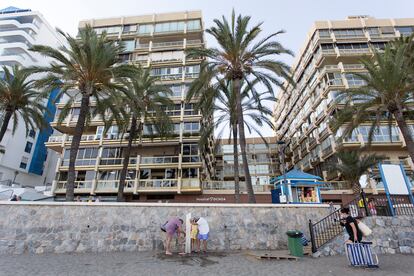Two decades later, thousands of Marbella homes still in a legal limbo
Around 18,000 properties were built irregularly under former mayor Jesús Gil, but despite numerous court cases that canceled permits, chances are good they will never be torn down


In the late 1990s, the city of Marbella in Spain’s Costa del Sol was the Wild West. The mayor at the time, Jesús Gil, encouraged the construction of thousands of homes out of pure speculative greed. Housing towers and residential developments mushroomed on land that had been reserved for schools, health centers, parks and, in one case, a bus station.
This untrammeled development was based on a city zoning plan (PGOU) devoid of content that was ultimately approved in 1998 at a council session held in the middle of the night and struck down years later by the courts.
After Gil (who served between 1991 and 2002 and died in 2004), the mayor’s office was occupied by Julián Muñoz, Marisol Yagüe and Tomás Riñones, all of whom kept up similar levels of frantic development – that is, until they ended up in jail and the entire Marbella government was sacked and replaced with administrators, as part of a major anti-corruption sweep known as Operation Malaya.
Eviction rulings are carried out swiftly, but those that entail tearing down a building, are forgottenInmaculada Gálvez, lawyer representing Marbella resident
This investigation led to a huge corruption trial broken into hundreds of related cases that gradually struck down all those illegal permits. The city then found itself with around 18,000 irregularly built homes that some people believe should be torn down and others feel should be allowed to stay. In the last 20 years, only a handful have been razed.
Carmen Suárez, 87, is one of the victims of the rampant speculation of 1990s Marbella. Gil had a 12-story tower built right in front of her little family house with a garden and views of the sea. The tower was declared illegal long ago, but Carmen continues to suffer the consequences. To this day she is afraid to hang the washing on the rooftop of her home, because of all the cigarette butts, bottles and assorted trash that people throw down from the apartments.
“We’ve won all the court cases, but it’s of no use,” she says. Her lawyer, Inmaculada Gálvez, has been battling by her side for the last 23 years in the so-called Belmonsa case. “The situation is shameful and a source of despair. Eviction rulings are carried out swiftly, but those that entail tearing down a building, such as this one, are forgotten,” says Gálvez, for whom the fight has become personal.
Gálvez sees a clear case of “disobedience” by the city government of Marbella, now run by Ángeles Muñoz of the Popular Party (PP). “They never had the will to solve the problem, not them and not the [regional] government of Andalusia, which is not taking charge of the subsidiary enforcement.”

According to the law, an administrative act resulting from a crime is void; this was the basis for declaring hundreds of housing permits irregular. The regional government, which in 2019 issued a decree that might lead to the legalization of over 327,000 homes across Andalusia, says that it has “systematically” demanded of the city of Marbella that it carry out instructions in court rulings.
Regional authorities also noted that in 2010, the local council approved new planning bylaws meant to legalize the vast majority of these homes. The wording of the new regulations replaced demolitions with compensation by owners and property developers, but this solution was struck down by the Supreme Court in 2015, on the basis that a zoning plan cannot be used to grant legal status to earlier illegal acts. And so Marbella continues to be guided by a zoning plan from 1986, and the homes under suspicion are still there.
Fernando Benítez, of the environmental division at the Málaga Provincial Prosecutor’s Office, is known around here as the “Demolition Man” because half his work is devoted to ensuring that demolition court orders are carried out. He is stubborn and persistent, but most town halls still refuse to comply. In three years, only two or three homes have been torn down in the entire province of Málaga. If he’s lucky, Benítez reaches his goal after insisting for 10 to 15 years.
Unfettered development is still underway. We haven’t learned to be sustainable, only to twist the rules in order to turn illegal things into legalSource from green group Ecologists in Action
This prosecutor explains that in the case of Marbella, it is likely that no homes will be torn down because most of the adverse court rulings are over crimes by elected officials who deliberately made unlawful decisions. This typically leads to prison terms, fines and bans from public office for the officials in question, but not to the demolition of the homes they allowed to go up.
“For reasons of strict legality, you can’t tear all those homes down. But it’s more than that. It would be crazy to raze all those residential developments that are now home to hundreds of people, without letting the local government consider what can be kept, changed or torn down from the point of view of city planning,” explains Benítez, who believes demolishing all those homes would do more harm than good, and that they will remain where they are unless the city decides to eliminate them. But that would mean paying out damages to homeowners, said several legal experts consulted on the matter. “It would mean complete ruin for Marbella,” said one lawyer.
Enrique Sánchez, head of the city’s legal services for eight years, believes that many of these buildings will end up being assimilated despite remaining outside the framework of planning laws. “They don’t get torn down, but they are not legal, either,” he says.
Meanwhile, 87-year-old Inmaculada Gálvez continues to defend that if a permit is annulled, the next logical step is demolition. And that is why she writes to the courts every month to urge them to do so. “Their answer? I get ignored,” she says.
Marbella officials say they are working on a solution. In 2019, the city council began drafting a new PGOU that will seek ways “to fit” the irregular homes into “the new city model,” according to Marbella’s director general of city planning, José María Morente. The local government is hoping that the initial approval of the plan will take place sometime this year under the umbrella of a new regional sustainability law called LISTA. But legal experts said that the new plan will largely serve the needs of the real estate market.
Sources at the green group Ecologists in Action add that Marbella has been working with a 35-year-old zoning plan and “it has never stopped building despite the shortage of public infrastructure.” As a matter of fact, licenses for new construction are routinely announced – most recently two worth €13 million – and the system continues to be based on rezoning land previously off-limits for construction. “Unfettered development is still underway,” said the same source. “We haven’t learned to be sustainable, only to twist the rules in order to turn illegal things into legal.”
In Marbella, the word demolition simply does not exist.
English version by Susana Urra.
Tu suscripción se está usando en otro dispositivo
¿Quieres añadir otro usuario a tu suscripción?
Si continúas leyendo en este dispositivo, no se podrá leer en el otro.
FlechaTu suscripción se está usando en otro dispositivo y solo puedes acceder a EL PAÍS desde un dispositivo a la vez.
Si quieres compartir tu cuenta, cambia tu suscripción a la modalidad Premium, así podrás añadir otro usuario. Cada uno accederá con su propia cuenta de email, lo que os permitirá personalizar vuestra experiencia en EL PAÍS.
¿Tienes una suscripción de empresa? Accede aquí para contratar más cuentas.
En el caso de no saber quién está usando tu cuenta, te recomendamos cambiar tu contraseña aquí.
Si decides continuar compartiendo tu cuenta, este mensaje se mostrará en tu dispositivo y en el de la otra persona que está usando tu cuenta de forma indefinida, afectando a tu experiencia de lectura. Puedes consultar aquí los términos y condiciones de la suscripción digital.








































